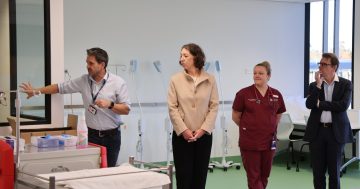
Cooma and Bombala GP Dr Hamish Steiner believes rural maternity services are incredibly important to small hospitals. Photo: Supplied.
A major national forum on rural maternity services has delivered suggested high-priority actions and solutions for governments and health services to vastly improve access to local maternity care for rural women and their babies.
More than 70 key stakeholders met at Parliament House in Canberra to discuss the issues and challenges in supporting rural women to birth safely close to home.
The National Rural Maternity Forum was held against the background of more than 150 rural maternity units having been closed over the past 20 years, with many others downgraded and bypassed.
Hosted by the Office of the National Rural Health Commissioner and supported by the Rural Doctors Association of Australia (RDAA) and the Australian College of Midwives (ACM), discussions at the forum were focused on developing a suite of agreed solutions that could help return, retain and develop maternity services in rural and remote communities.
“The importance of local maternity services to rural and remote communities was underlined by the incredibly high level of interest and wide range of attendees at the forum,” ACM chief midwife Alison Weatherstone said.
“The 70 attendees included consumers of rural maternity services, midwives, Aboriginal and Torres Strait Islander peak bodies, Rural Generalist (RG) obstetricians, GPs and GP obstetricians, consultant specialist obstetricians, nurses, allied health and representatives from the state and federal health departments.
“Importantly, a number of those in attendance were rural mothers themselves, so have had direct knowledge of the challenges that rural and remote women face in accessing maternity care and birthing services in their own communities – and rural mothers’ experiences were also shared via video at the forum.
“The overwhelming support we received for the forum – and the practical steps that our attendees delivered yesterday – really demonstrate the strong interest there is in addressing the challenges that have affected rural maternity services for so long.
“Further significant investment and a targeted focus is needed to halt the decline in these much-needed services in rural communities. We call on the Government to make rural maternity services a health reform priority.”
Cooma and Bombala GP Dr Hamish Steiner said rural maternity services were incredibly important to small hospitals.
“If a hospital loses its maternity services, then a lot of other services that are provided also tend to disappear,” Dr Steiner said.
“It’s really hard to recruit doctors and midwives to small hospitals and we’ll be hoping that some of the solutions to come out of the meeting in Canberra may help this.
“Rural maternity services have really been in a crisis situation for the last 25 years, and the slow recognition of this has not helped.
“I will be hoping for some positive changes out of this meeting.”
RDAA president Dr Megan Belot said it was wonderful to see positive, practical solutions coming from the forum.
“The first step following our forum will be for the National Rural Health Commissioner, Adjunct Professor Ruth Stewart, to discuss the priority recommendations with government and department representatives,” Dr Belot said.
Other key actions coming out of the forum include:
- Requesting that the issue of rural birthing services be included on the agenda for a forthcoming National Cabinet meeting that will focus on health.
- Expansion of the use of the RISE Framework to not only increase Birthing on Country services nationally, but also more broadly to include rural and remote maternity care. The RISE Framework’s four pillars to drive this important reform include redesigning health services, investing in the workforce, strengthening families, and embedding Aboriginal and/or Torres Strait Islander community governance and control.
- Secure funding for a National Maternity Workforce Plan, in order to build and sustain a strong rural maternity care workforce of midwives, GP and RG obstetricians, consultant specialist obstetricians, Aboriginal health workers, and allied health professionals.
- Establishing national minimum standards for rural maternity care access and service. The issue of national consistency for a range of other maternity policy areas was also a subject of much discussion during the forum.
- Reviewing the National Consensus Framework for Rural Maternity Services, updating it to reflect changes and advances within maternity care, and then its immediate implementation.
“These actions are essential to ensuring that we not only save rural maternity services from closure and downgrading, but indeed expand their role in their communities, ensure their sustainability into the future, and reopen previously closed maternity service,” Dr Belot said.
“Rural and remote women and their babies deserve local access to high-quality birthing services.
“Our forum has delivered key actions that can help make this happen.”
















